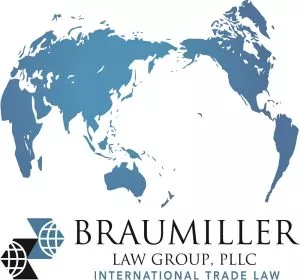On May 14, 2024, the United States Trade Representative (USTR) released its Final Report relating to the four-year review of actions taken in the Section 301 investigation. Within the Report, the USTR confirmed that it intends to take actions to raise tariffs on specific products as a result of the comprehensive review. In general, the USTR's review determined that China has not eliminated technology transfer actions that imposed a burden on U.S. commerce. The Report also found that China is using aggressive cybertheft and hacking to illicitly acquire technology without payment or contractual protection for the technology owners. In addition, the Report found that existing tariff actions have been effective in encouraging China to begin eliminating its technology transfer actions. However, it also found that China has failed to eliminate all or even many of its technology transfer actions and practices. The U.S. International Trade Commission (USITC) supplied the benchmark economic analysis that shows that Section 301 tariffs help to reduce U.S. imports of goods from China and shift imports to alternate sources potentially supporting U.S. supply chain diversification and resilience.
Further, the Report found that China has targeted a wide range of technology products including solar products, lithium-ion batteries, electric vehicles, permanent magnets, semiconductors, and the processing of critical minerals, including graphite, to dominate global markets in these important strategic sectors. The Report therefore proposed several modifications to the existing tariff program that will help encourage the elimination of illicit technology transfer and reduce the burden on the U.S. economy by encouraging alternative sourcing in strategic sectors of the economy. It also found that following passage of the Inflation Reduction Act (IRA), the U.S. economy has made significant investments into clean energy technology, clean energy supply chains, and clean energy manufacturing. The U.S. government has encouraged, and the private sector has made significant investments, to improve U.S. economic competitiveness, innovation, production, and technology in strategic sectors. These include clean energy technology, clean energy supply chains, clean energy manufacturing, including solar technology, foundational semiconductor production, lithium-ion batteries, and electric vehicles. Increased tariffs on competing Chinese origin products will help encourage domestic production capacity. In addition, China's over-production of steel and aluminum has distorted global markets, warranting increased tariffs. Increasing the Section 301 duties on critical medical supplies, including medical/surgical gloves and face masks, syringes, and needles, which are critical to U.S. preparedness and response to public health emergencies, will help ensure U.S. access to alternative sources.
The Report explained that pursuant to Section 307(c) and Section 307(a)(1) of the Trade Act of 1974, as amended ("Trade Act") (19 U.S.C. 2411), USTR has the authority to modify or terminate any action, subject to the specific direction of the President taken under section 301 of the Trade Act, against any goods or economic sector of the foreign country concerned (China) regardless of whether or not such goods or economic sector are involved in the act, policy, or practice subject to investigation.
The Report proposed adding or increasing section 301 tariffs for certain products in strategic sectors, including:
- Battery parts (non-lithium-ion batteries)
- Electric vehicles
- Facemasks
- Lithium-ion electrical vehicle batteries
- Lithium-ion non-electrical vehicle batteries
- Medical gloves
- Natural graphite
- Other critical minerals
- Permanent magnets
- Semiconductors
- Ship to shore cranes
- Solar cells (whether or not assembled into modules)
- Steel and aluminum products
- Syringes and needles
As a result of the May 14th report, and consistent with the recommendations made by President Biden, the USTR released the following FR Notice on May 28th: https://ustr.gov/sites/default/files/Section%20301%20Exclusion%20Extension%20FRN_0.pdf.
Within the FR Notice, the proposed actions by the USTR included the following:
- Modifying the Section 301 actions by adding or increasing section 301 ad valorem rates of duty, as directed by the President, for certain products of China in strategic sectors.
- Opening a subheading eligible for an exclusion process by which interested persons may request that particular machinery used in domestic manufacturing be temporarily excluded from section 301 tariffs.
- Modifying the actions by granting 19 temporary exclusions for certain solar manufacturing equipment.
Based on these proposals, the USTR opened a formal comment period so that interested parties can comment on the following:
- The effectiveness of the proposed modification in obtaining the elimination of or in counteracting China's acts, policies, and practices related to technology transfer, intellectual property, and innovation.
- The effects of the proposed modification on the U.S. economy, including consumers.
- The scope of the product description to cover ship-to-shore cranes under subheading 8426.19.00 (Transporter cranes, gantry cranes and bridge cranes).
- With respect to facemasks, medical gloves, and syringes and needles, whether the tariff rates should be higher than the proposed rates.
- With respect to facemasks, whether additional statistical reporting codes under tariff subheading 6307.90.98 should be included.
- Whether the tariff subheadings identified for each product and sector adequately cover the products and sectors included in the President's direction to the Trade Representative.
- With respect to the exclusion process, USTR seeks comments on whether the subheadings listed in Annex B should, or should not be, eligible for consideration in the machinery exclusion process and whether Annex B omits certain subheadings under Chapters 84 and 85 that cover machinery used in domestic manufacturing and should be included.
- With respect to the proposed solar manufacturing machinery exclusions in Annex C, USTR requests comments on the scope of each exclusion, including any suggested amendments to the product description.
The comment period opens on May 29th and closes on June 28th. Commentors can submit written comments using the docket on the portal at https://comments.ustr.gov/. To submit written comments, use the docket on the portal entitled Request for Comments: Proposed Modifications to the Section 301 Actions and Proposed Exclusion Process, docket number USTR–2024–0007.
Businesses should closely review the recommended changes by the USTR to determine if comments should be submitted based on its specific product lines. The current Administration has made it clear that it intends to continue applying punitive tariffs against China until its unfair trade practices are corrected. If your Company has products that may be subject to an increase in Section 301 tariffs, and you want to discuss the changes in more detail, feel free to reach out to Bob Brewer at Bob@Braumillerlaw.com.
Check out our new Digital Magazine Get the inside scoop on the Braumiller Law Group & Braumiller Consulting Group "peeps." Expertise in International Trade Compliance.
The content of this article is intended to provide a general guide to the subject matter. Specialist advice should be sought about your specific circumstances.


